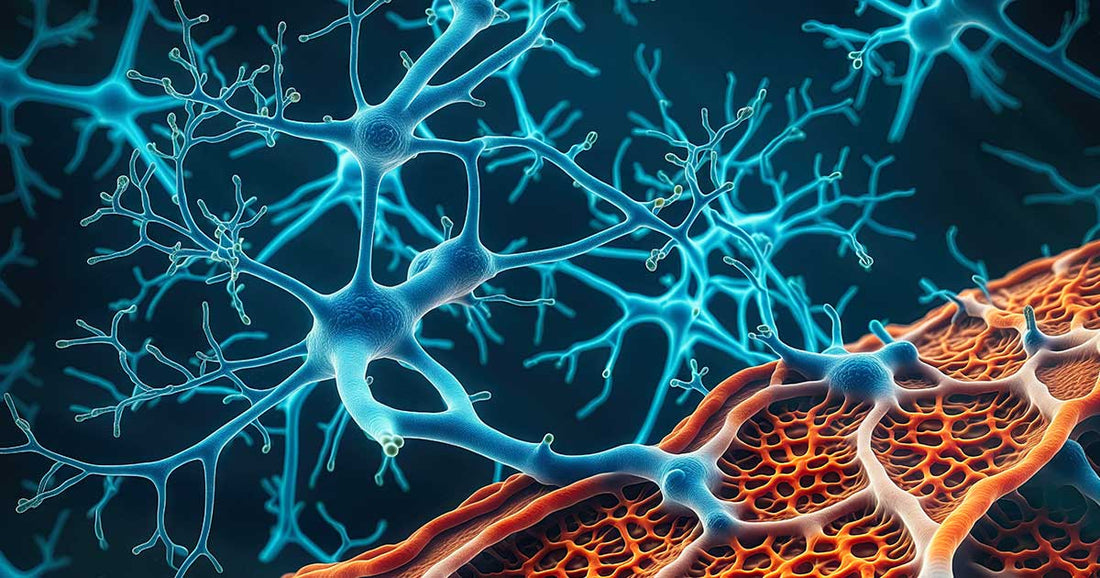
The Golden Spice: Exploring Turmeric’s Power Against Inflammation and Its Potential in Neuroregeneration
Share
Turmeric, a bright yellow spice known for its robust earthy flavor and golden hue, has been a cornerstone in culinary and medicinal practices, especially in Ayurvedic and Chinese medicine, for thousands of years. Beyond its culinary uses, turmeric is highly celebrated for its potent anti-inflammatory properties and its role in neuroregeneration. Much recent research has focused on a lesser-known turmeric compound called ar-turmerone alongside the more commonly recognized curcumin.[1]
Turmeric and Its Compounds
Turmeric contains several compounds known as curcuminoids, with curcumin being the most active and prevalent.[1] However, turmeric’s therapeutic potential is not only due to curcumin. Another significant, though less extensively studied compound, ar-turmerone, has shown promising results, particularly in brain health and neuroregeneration.[2]
Anti-inflammatory Properties of Turmeric
Chronic inflammation is a root cause of many serious diseases, including heart disease, cancer, metabolic syndrome, Alzheimer's disease, and various degenerative conditions. Curcumin in turmeric has been shown to match the effectiveness of some anti-inflammatory drugs without the side effects.[1] It blocks NF-kB, a molecule that travels into the nuclei of cells and turns on inflammation-related genes. NF-kB is believed to play a major role in many chronic diseases.
Despite these benefits, curcumin's bioavailability can be quite low; hence, it is often paired with BioPerine® (trademarked piperine), known to enhance curcumin absorption by up to 2,000%.
Ar-Turmerone and Neuroregeneration
Recent studies have shed light on another fascinating aspect of turmeric involving ar-turmerone. Research, particularly a study published in Stem Cell Research & Therapy, indicates that ar-turmerone can help repair brain function in neurodegenerative diseases such as Alzheimer’s and stroke.[3] Ar-turmerone promotes the proliferation of neural stem cells (NSCs), which play a vital role in self-repair and recovery of brain function. Unlike curcumin, which works more to inhibit inflammatory pathways, ar-turmerone actively encourages the growth and development of nerve cells.
In animal models, ar-turmerone has increased NSC proliferation by up to 80%, significantly aiding the recovery process following degenerative damage.[4] This suggests a high potential for developing therapeutic applications for treating diseases that involve degenerative processes.
Adding Turmeric to Your Diet
Incorporating turmeric into your diet can be as simple as adding the spice to your meals, drinking turmeric tea, or taking a daily supplement.[5] However, to truly benefit from turmeric, it needs to be taken in a form that enhances its bioavailability. For instance, combining turmeric with black pepper in food or choosing supplements enhanced with BioPerine® can dramatically increase its absorption and efficacy.
True Cellular Formulas Turmeric Curcumin Complex with BioPerine®

The True Cellular Formulas Turmeric Curcumin Complex with BioPerine® is at the forefront of optimized turmeric supplements. This supplement is specifically designed to maximize the plant's anti-inflammatory and neuroregenerative potential. It not only contains a high concentration of curcuminoids but also is enhanced with BioPerine® for increased absorption, ensuring that you receive the maximum benefits from each dose. Whether you’re addressing specific health issues like chronic inflammation, seeking to recover from neurological conditions, or simply aiming to maintain optimum health, this complex offers a comprehensive solution. It harnesses the ancient wisdom of turmeric tailored to modern health needs.
In conclusion, turmeric, particularly its compounds curcumin and ar-turmerone, offers significant health benefits, particularly in fighting inflammation and assisting in neuroregeneration.True Cellular Formulas Turmeric Curcumin Complex with BioPerine® optimally delivers these benefits directly to your cells, supporting your health in the most effective way possible. Embrace the power of turmeric and feel the difference in your cognitive and physical well-being.
References:
- Sahdeo Prasad and Bharat B. Aggarwal.Chapter 13Turmeric, the Golden Spice.https://www.ncbi.nlm.nih.gov/books/NBK92752/
- Javad Sharifi-Rad, Youssef El Rayess, Alain Abi Rizk, Carmen Sadaka, Raviella Zgheib, Wissam Zam, Simona Sestito, Simona Rapposelli, Katarzyna Neffe-Skocińska, Dorota Zielińska, Bahare Salehi, William N. Setzer, Noura S. Dosoky, Yasaman Taheri, Marc El Beyrouthy, Miquel Martorell, Elise Adrian Ostrander, Hafiz Ansar Rasul Suleria,William C. Cho, Alfred Maroyi, and Natália Martins.Turmeric and Its Major Compound Curcumin on Health: Bioactive Effects and Safety Profiles for Food, Pharmaceutical, Biotechnological and Medicinal Applications.11: 01021.2020 Sep 15. doi: 10.3389/fphar.2020.01021.PMCID: PMC7522354.PMID: 33041781
- Joerg Hucklenbroich, Rebecca Klein, Bernd Neumaier, Rudolf Graf, Gereon Rudolf Fink, Michael Schroeter & Maria Adele Rueger.Aromatic-turmerone induces neural stem cell proliferation in vitro and in vivo.https://stemcellres.biomedcentral.com/articles/10.1186/scrt500
- Joerg Hucklenbroich, Rebecca Klein, Bernd Neumaier, Rudolf Graf, Gereon Rudolf Fink, Michael Schroeter, and Maria Adele Rueger.Aromatic-turmerone induces neural stem cell proliferation in vitro and in vivo.5(4): 100.2014 Sep 26. doi: 10.1186/scrt500.PMCID: PMC4180255.PMID: 25928248
- Sahdeo Prasad and Bharat B. Aggarwal.Chapter 13Turmeric, the Golden Spice.https://www.ncbi.nlm.nih.gov/books/NBK92752/
